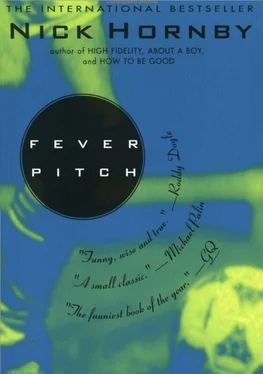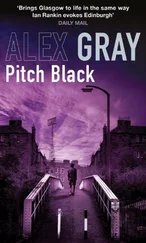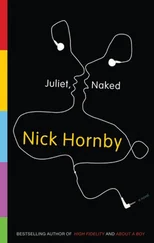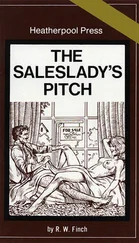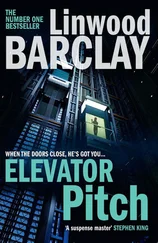ARSENAL v MANCHESTER UNITED
(at Wembley) 12.5.79
I had no ambitions for myself whatsoever before I was twenty-six or twenty-seven, when I decided that I could and would write for a living, packed my job in and waited around for publishers and/or Hollywood producers to call me up and ask me to do something for them sight unseen. Friends at college must have asked me what I intended to do with my life, particularly because by now I was in my final term; but the future still seemed to me as unimaginable and as uninteresting as it had when I was four or five, so I have no idea what I might have answered. I probably mumbled something about journalism or publishing (the aimless arts undergraduate’s exact equivalent of train driving or astronautics), but privately I was beginning to suspect that as I had spent my three years unwisely, these careers would not be possible. I knew people who had spent their entire undergraduate lives writing for university newspapers who were not being offered jobs, so what chance did I stand? I decided that it would be better not to know, and therefore applied for nothing at all.
I may have had no ideas for myself, but I had big ideas for my football teams. Two of these dreams—Cambridge United’s promotion from the Fourth to the Third, and then from the Third to the Second—had been realised already. But the third and most burning ambition, to see Arsenal win the FA Cup at Wembley (and maybe this was, after all, a personal ambition, in that my presence was an essential part of it), still remained unfulfilled.
The team had done remarkably well to return to the Cup Final for a second consecutive season. It took them five games to get past Third Division Sheffield Wednesday (the police have recently decided, in their community-serving way, that the beautiful and strange FA Cup tradition of the multi-game marathon should not be allowed to continue); they then had a tough away draw at Nottingham Forest, the European champions, and another tricky game at Southampton, won after a replay by two brilliant Alan Sunderland goals. The semi-final against Wolves was comparatively straightforward, despite Brady’s absence through injury: two second-half goals, from Sunderland and Stapleton, and they were back at Wembley.
Exactly a decade after the Manchester United Cup Final, in May 1989, I was waiting to hear news about a script I had written at the same time as Arsenal’s best chance of winning the Championship for eighteen years seemed to be disappearing fast. The script, a pilot for a projected sitcom, had got further than usual; there had been meetings with people from Channel 4, and great enthusiasm, and things looked good. But in despair after a bad result, a home defeat by Derby on the final Saturday of the season, I offered up my work (the acceptance of which would have rescued a career and a self-regard heading for oblivion) on some kind of personal sacrificial altar: if we win the League, I won’t mind the rejection slip. The rejection slip duly came, and hurt like hell for months; but the Championship came too, and now, two years later, when the disappointment has long gone but the thrill of Michael Thomas’s goal still gives me goose pimples when I think about it, I know that the bargain I made was the right one.
In May 1979 the potential for trade-offs was extensive and complicated. On the Thursday before the Cup Final, Mrs Thatcher was attempting to win her first General Election; on the Thursday after, my finals began. Of the three events, the Cup Final, obviously, was the one that concerned me most, although I was also perturbed, just as obviously, by the prospect of Mrs Thatcher becoming Prime Minister. (Maybe in another, quieter week I would have found time and energy to fret about my examinations, but a mediocre degree was now an inevitability, and in any case at British universities it is as easy to graduate as it is to have a birthday: just hang around for a while and it will happen.) Yet the terrible truth is that I was willing to accept a Conservative government if it guaranteed an Arsenal Cup Final win; I could hardly have been expected to anticipate that Mrs Thatcher would go on to become the longest serving Prime Minister this century. (Would I have made the same bargain if I had known? Eleven years of Thatcherism for the FA Cup? Of course not. I wouldn’t have settled for anything less than another Double.)
The fact that the Tories won comfortably on the Thursday didn’t mean that I expected us to win comfortably on the Saturday. I knew that making bargains, like squeezing putty and wearing certain shirts, didn’t guarantee success, and in any case the other finalists, Manchester United, were a proper team, not a roll-over-and-die, only-here-for-the-beer shower, like, well, like Ipswich, say, or Swindon. Manchester United were the kind of team who might well unsportingly ignore General Election deals simply by scoring loads of goals and thrashing us.
For most of the game, however, United played as if they knew what my deal had been and were more than happy to fulfil their side of it. Arsenal scored twice in the first half, the opening goal after twelve minutes (the first time in four games I had seen Arsenal take the lead at Wembley), the second goal right before half-time; the interval was a blissfully relaxed fifteen minutes of raucous celebration. Most of the second half passed by in the same way, until with five minutes to go Manchester United scored … and with two minutes to go, in traumatising and muddled slow motion, they scored again. We had thrown the game away, players and fans all knew that, and as I watched the United players cavort on the touchline at the far end I was left with the terrible feeling that I’d had as a child—that I hated Arsenal, that the club was a burden I could no longer carry but one that I would never, ever be able to throw off.
I was high up on the terraces with the other Arsenal fans, right behind the goal that Manchester United were defending; I sat down, too dizzy with pain and anger and frustration and self-pity to remain on my feet any longer. There were others who did the same, and behind me a pair of teenage girls were weeping silently, not in the hammy fashion of teenage girls at Bay City Rollers concerts, but in a way that suggested a deep and personal grief.
I was looking after a young American lad for the afternoon, a friend of the family, and his mild sympathy but obvious bafflement threw my distress into embarrassing relief: I knew that it was only a game, that worse things happened at sea, that people were starving in Africa, that there might be a nuclear holocaust within the next few months; I knew that the score was still 2-2, for heaven’s sake, and that there was a chance that Arsenal could somehow find a way out of the mire (although I also knew that the tide had turned, and that the players were too demoralised to be able to win the game in extra time). But none of this knowledge could help me. I had been but five minutes away from fulfilling the only fully formed ambition I had ever consciously held since the age of eleven; and if people are allowed to grieve when they are passed over for promotion, or when they fail to win an Oscar, or when their novel is rejected by every publisher in London—and our culture allows them to do so, even though these people may only have dreamed these dreams for a couple of years, rather than the decade, the half-lifetime , that I had been dreaming mine—then I was bloody well entitled to sit down on a lump of concrete for two minutes and try to blink back tears.
And it really was for only two minutes. When the game restarted, Liam Brady took the ball deep into the United half (afterwards he said that he was knackered, and was only trying to prevent the loss of a third goal) and pushed it out wide to Rix. I was watching this, but not seeing it; even when Rix’s cross came over and United’s goalkeeper Gary Bailey missed it I wasn’t paying much attention. But then Alan Sunderland got his foot to the ball, poked it in, right into the goal in front of us, and I was shouting not “Yes” or “Goal” or any of the other noises that customarily come to my throat at these times but just a noise, “AAAARRRRGGGGHHHH”, a noise born of utter joy and stunned disbelief, and suddenly there were people on the concrete terraces again, but they were rolling around on top of each other, bug-eyed and berserk. Brian, the American kid, looked at me, smiled politely and tried to find his hands amidst the mayhem below him so that he could raise them and clap with an enthusiasm I suspected he did not feel.
Читать дальше
